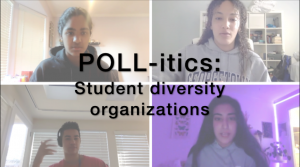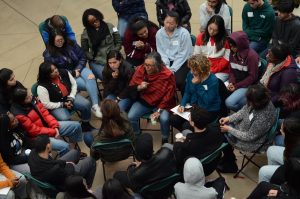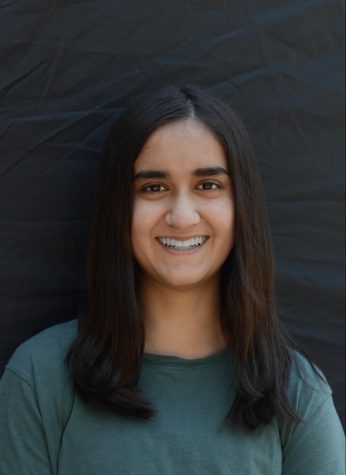Student Diversity Coalition holds fourth annual Student Diversity Leadership Gathering
Provided by Tyeshia Brown
Nationally-recognized diversity practitioner and consultant and adult session speaker Toni Graves Williamson presents on turning fragility into agility through steps such as self-reflection and being willing to listen to others. More than 50 people attended this year’s Student Diversity Leadership Gathering, and attendees from the Harker community were joined by students and teachers from other schools such as Menlo High School and the Kirby School in Santa Cruz.
March 21, 2022
Warning: The following story contains an image with headlines mentioning violence and suicide and may be upsetting to some readers.
Student, teacher and faculty attendees begin piling into the Zoom room at the start of the virtual fourth annual Student Diversity Leadership Gathering (SDLG). Mics off and videos on, attendees fill the screen, ready to engage with and discuss the topics of this year’s gathering.
The Student Diversity Coalition (SDC) hosted the fourth annual Student Diversity Leadership Gathering (SDLG) virtually on Feb. 5 from 10 a.m. to 1:30 p.m., featuring diversity, equity and social justice speaker Dr. Rodney Glasgow and diversity practitioner and consultant Toni Graves Williamson.
Facilitated by the Harker School’s SDC advisors and members each year, the SDLG, a local version of the National Association of Independent Schools (NAIS) Student Diversity Leadership Conference (SDLC), invites students, faculty and staff from schools in California to attend speaker events and participate in activities exploring diversity and social activism.
This year’s gathering, centered on the topic of cultural competency, began with speaker events in the main Zoom room, after which adults and students split into separate rooms for discussions and activities. While organizing the gathering, SDC members discussed with SDC Chair and TK-12 Diversity Coordinator Tyeshia Brown before deciding on cultural competency as the focus of this year’s discussion because of its relevance among students and in society.
“[Cultural competency is] to understand different cultures, understand that we are all raised different — our culture, our backgrounds are all different,” Brown said. “Understanding that certain [cultural customs] happen in certain families that are different [from others] will help us understand not to judge right away.”
Brown expressed hope that the gathering would help attendees develop a stronger sense of understanding of different cultures and opinions and feel more comfortable discussing social issues pertaining to diversity and equity.
“We’ve had quite a few people come to us and talk to us about how to have some of these conversations, and being afraid to have some of these conversations, for many reasons,” Brown said. “So the cancel culture is very big right now, and I think that people are afraid to ask questions and have these conversations because they’re afraid to be ‘canceled.’ So we talk about, how do we have these conversations?”
More than 50 people attended the event. Attendees from the Harker community were joined by students and teachers from other schools such as Menlo High School and the Kirby School in Santa Cruz.
Upper school history and social science teacher Dr. Chuck Witschorik attended last year’s SDLG as a BASIS Independent Silicon Valley teacher.
“[Dr. Glasgow] was inspiring both times, just to kind of talk about his personal experiences as an African American man, and also an out LGBTQ+ person, and school administrator,” Dr. Witschorik said. “He shared some, especially last year, I think he’s shared some inspiring, moving personal stories that I found to be impactful.”
Dr. Glasgow, a returning speaker for the gatherings since the first SDLG was hosted in 2019, began the event at 10 a.m. with a keynote speech, with Williamson presenting afterward. Both presentations focused on obstacles to developing cultural competency and discussed methods to deal with the challenges. Dr. Glasgow spoke on dominant fragility, where those in a dominant position of power feel uncomfortable when their position is challenged. Williamson’s speech introduced the topic of white fragility, discomfort on the part of a white person when confronted with information about racial inequality. Both speakers discussed how to identify white fragility, after which Williamson offered advice on turning fragility into agility through steps such as self-reflection, being willing to listen to others and being open to having conversations with people holding different social and political viewpoints to resolve conflicts.
Separate student and adult sessions began at 11:20 a.m., offering a safe space for students and educators to participate in activities helping to broaden understanding of diverse perspectives and opinions in a variety of scenarios.
The students engaged in whistleblower role plays where they were presented scenarios of different social issues in which they could choose whether to speak up against the situation. White people were given five opportunities to speak up, whereas people of color were limited to three, to reflect white privilege in making these decisions, but also general limited ability to speak up in every issue witnessed. Afterwards, students who spoke up in each scenario discussed why they chose that particular situation to do so.
“It was eye opening, because there were some [situations] that I didn’t see the other side of,” student attendee Harshini Chaturvedula (10) said. “And so when other people were speaking, I was like, ‘Oh, so that’s another way to look at it.’ [It was an] interesting experience.”
When the adults rejoined the main Zoom room at the end of the event, students and adults each shared the main topics of their discussions, which was followed by a personal reflection and closing at 1:30 p.m.
“My favorite part was when we came back, and the adults learned about what the students had been discussing, and vice versa,” Dr. Witschorik said. “It was inspiring just to see how both the teachers and the students had learned and had gotten inspiration for ideas they could take back to school to Harker to implement.”


















![“[Building nerf blasters] became this outlet of creativity for me that hasn't been matched by anything else. The process [of] making a build complete to your desire is such a painstakingly difficult process, but I've had to learn from [the skills needed from] soldering to proper painting. There's so many different options for everything, if you think about it, it exists. The best part is [that] if it doesn't exist, you can build it yourself," Ishaan Parate said.](https://harkeraquila.com/wp-content/uploads/2022/08/DSC_8149-900x604.jpg)




![“When I came into high school, I was ready to be a follower. But DECA was a game changer for me. It helped me overcome my fear of public speaking, and it's played such a major role in who I've become today. To be able to successfully lead a chapter of 150 students, an officer team and be one of the upperclassmen I once really admired is something I'm [really] proud of,” Anvitha Tummala ('21) said.](https://harkeraquila.com/wp-content/uploads/2021/07/Screen-Shot-2021-07-25-at-9.50.05-AM-900x594.png)







![“I think getting up in the morning and having a sense of purpose [is exciting]. I think without a certain amount of drive, life is kind of obsolete and mundane, and I think having that every single day is what makes each day unique and kind of makes life exciting,” Neymika Jain (12) said.](https://harkeraquila.com/wp-content/uploads/2017/06/Screen-Shot-2017-06-03-at-4.54.16-PM.png)








![“My slogan is ‘slow feet, don’t eat, and I’m hungry.’ You need to run fast to get where you are–you aren't going to get those championships if you aren't fast,” Angel Cervantes (12) said. “I want to do well in school on my tests and in track and win championships for my team. I live by that, [and] I can do that anywhere: in the classroom or on the field.”](https://harkeraquila.com/wp-content/uploads/2018/06/DSC5146-900x601.jpg)
![“[Volleyball has] taught me how to fall correctly, and another thing it taught is that you don’t have to be the best at something to be good at it. If you just hit the ball in a smart way, then it still scores points and you’re good at it. You could be a background player and still make a much bigger impact on the team than you would think,” Anya Gert (’20) said.](https://harkeraquila.com/wp-content/uploads/2020/06/AnnaGert_JinTuan_HoHPhotoEdited-600x900.jpeg)

![“I'm not nearly there yet, but [my confidence has] definitely been getting better since I was pretty shy and timid coming into Harker my freshman year. I know that there's a lot of people that are really confident in what they do, and I really admire them. Everyone's so driven and that has really pushed me to kind of try to find my own place in high school and be more confident,” Alyssa Huang (’20) said.](https://harkeraquila.com/wp-content/uploads/2020/06/AlyssaHuang_EmilyChen_HoHPhoto-900x749.jpeg)



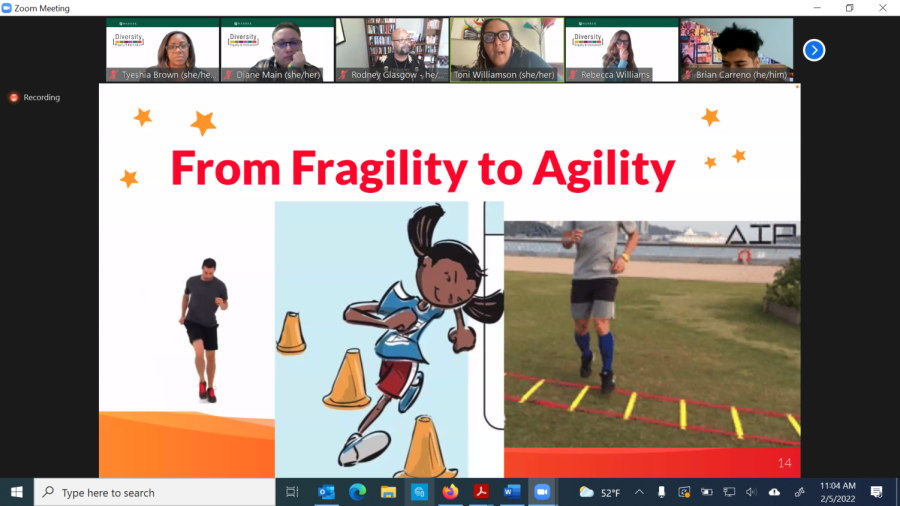
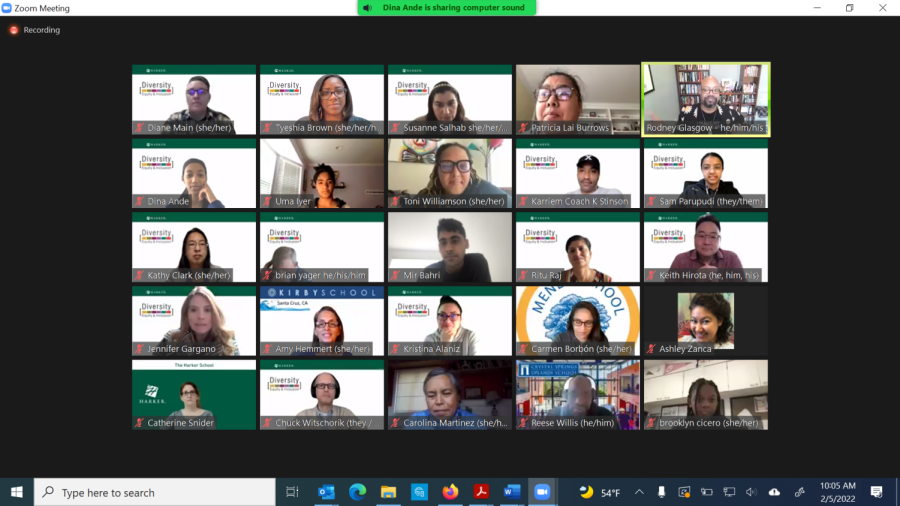
![Student Diversity Coalition representatives Uma Iyer (12) and Brooklyn Cicero (12) introduce Challenge Day on Friday. “[Challenge Day] was truly a transformative experience,” Brooklyn said in her speech. “It brought me a lot closer to my peers and allowed me to get very vulnerable with them, something that was a bit hard to do at first, but eventually I got used to it.”](https://harkeraquila.com/wp-content/uploads/2021/09/DSC_3179-e1631074854549-300x211.jpg)
